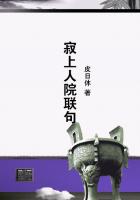"H'm! Once more. What do you think of Meyerbeer and Byron?""You have measured them by naming them together."The Count's carriage was waiting. The composer and his noble physician ran down-stairs, and in a few minutes they were with Marianna.
As they went in, Gambara threw himself into his wife's arms, but she drew back a step and turned away her head; the husband also drew back and beamed on the Count.
"Oh, monsieur!" said Gambara in a husky voice, "you might have left me my illusions." He hung his head, and then fell.
"What have you done to him? He is dead drunk!" cried Marianna, looking down at her husband with a mingled expression of pity and disgust.
The Count, with the help of his servant, picked up Gambara and laid him on his bed.
Then Andrea left, his heart exultant with horrible gladness.
The Count let the usual hour for calling slip past next day, for he began to fear lest he had duped himself and had made this humble couple pay too dear for their improved circumstances and added wisdom, since their peace was destroyed for ever.
At last Giardini came to him with a note from Marianna.
"Come," she wrote, "the mischief is not so great as you so cruelly meant it to be.""Excellenza," said the cook, while Andrea was ****** ready, "you treated us splendidly last evening. But apart from the wine, which was excellent, your steward did not put anything on the table that was worthy to set before a true epicure. You will not deny, I suppose, that the dish I sent to you on the day when you did me the honor to sit down at my board, contained the quintessence of all those that disgraced your magnificent service of plate? And when I awoke this morning I remembered the promise you once made me of a place as /chef/. Henceforth I consider myself as a member of your household.""I thought of the same thing a few days ago," replied Andrea. "Imentioned you to the secretary of the Austrian Embassy, and you have permission to recross the Alps as soon as you please. I have a castle in Croatia which I rarely visit. There you may combine the offices of gate-keeper, butler, and steward, with two hundred crowns a year. Your wife will have as much for doing all the rest of the work. You may make all the experiments you please /in anima vili/, that is to say on the stomach of my vassals. Here is a cheque for your traveling expenses."Giardini kissed the Count's hand after the Neapolitan fashion.
"Excellenza," said he, "I accept the cheque, but beg to decline the place. It would dishonor me to give up my art by losing the opinion of the most perfect epicures, who are certainly to be found in Paris."When Andrea arrived at Gambara's lodgings, the musician rose to welcome him.
"My generous friend," said he, with the utmost frankness, "you either took advantage, last evening, of the weakness of my brain to make a fool of me, or else your brain is no more capable of standing the test of the heady liquors of our native Latium, than mine is. I will assume this latter hypothesis; I would rather doubt your digestion than your heart. Be this as it may, henceforth I drink no more wine--for ever.
The abuse of good liquor last evening led me into much guilty folly.
When I remember that I very nearly----" He gave a glance of terror at Marianna. "As to the wretched opera you took me to hear, I have thought it over, and it is, after all, music written on ordinary lines, a mountain of piled-up notes, /verba et voces/. It is but the dregs of the nectar I can drink in deep draughts as I reproduce the heavenly music that I hear! It is a patchwork of airs of which I could trace the origin. The passage '/Gloire a la Providence/' is too much like a bit of Handel; the chorus of knights is closely related to the Scotch air in /La Dame Blanche/; in short, if this opera is a success, it is because the music is borrowed from everybody's--so it ought to be popular.
"I will say good-bye to you, my dear friend. I have had some ideas seething in my brain since the morning that only wait to soar up to God on the wings of song, but I wished to see you. Good-bye; I must ask forgiveness of the Muse. We shall meet at dinner to-night--but no wine; at any rate, none for me. I am firmly resolved--""I give him up!" cried Andrea, flushing red.
"And you restore my sense of conscience," said Marianna. "I dared not appeal to it! My friend, my friend, it is no fault of ours; he does not want to be cured."Six years after this, in January 1837, such artists as were so unlucky as to damage their wind or stringed instruments, generally took them to the Rue Froid-Manteau, to a squalid and horrible house, where, on the fifth floor, dwelt an old Italian named Gambara.
For five years past he had been left to himself, deserted by his wife;he had gone through many misfortunes. An instrument on which he had relied to make his fortune, and which he called a /Panharmonicon/, had been sold by order of the Court on the public square, Place du Chatelet, together with a cartload of music paper scrawled with notes.
The day after the sale, these scores had served in the market to wrap up butter, fish, and fruit.
Thus the three grand operas of which the poor man would boast, but which an old Neapolitan cook, who was now but a patcher up of broken meats, declared to be a heap of nonsense, were scattered throughout Paris on the trucks of costermongers. But at any rate, the landlord had got his rent and the bailiffs their expenses.















